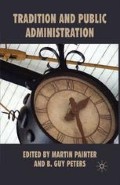Abstract
The concept of administrative traditions tends to emphasize the continuities in governing and in the organizational life of the public sector, or the significance of ‘legacy effects’. This persistent nature of public organizations is well known and indeed is virtually a stereotype of the public sector. By looking at traditions in administration, however, we are able to examine not whether individual public organizations are ‘immortal’ (Kaufman 1976) but whether their ways of organizing themselves and their styles of administering programs are enduring. Individual public organizations may come and go, but the underlying way of doing the public’s business may not change as rapidly.
Access this chapter
Tax calculation will be finalised at checkout
Purchases are for personal use only
Preview
Unable to display preview. Download preview PDF.
Author information
Authors and Affiliations
Editor information
Editors and Affiliations
Copyright information
© 2010 B. Guy Peters and Martin Painter
About this chapter
Cite this chapter
Peters, B.G., Painter, M. (2010). Conclusion: Administrative Traditions in an Era of Administrative Change. In: Painter, M., Peters, B.G. (eds) Tradition and Public Administration. Palgrave Macmillan, London. https://doi.org/10.1057/9780230289635_17
Download citation
DOI: https://doi.org/10.1057/9780230289635_17
Publisher Name: Palgrave Macmillan, London
Print ISBN: 978-1-349-36572-2
Online ISBN: 978-0-230-28963-5
eBook Packages: Palgrave Political & Intern. Studies CollectionPolitical Science and International Studies (R0)

